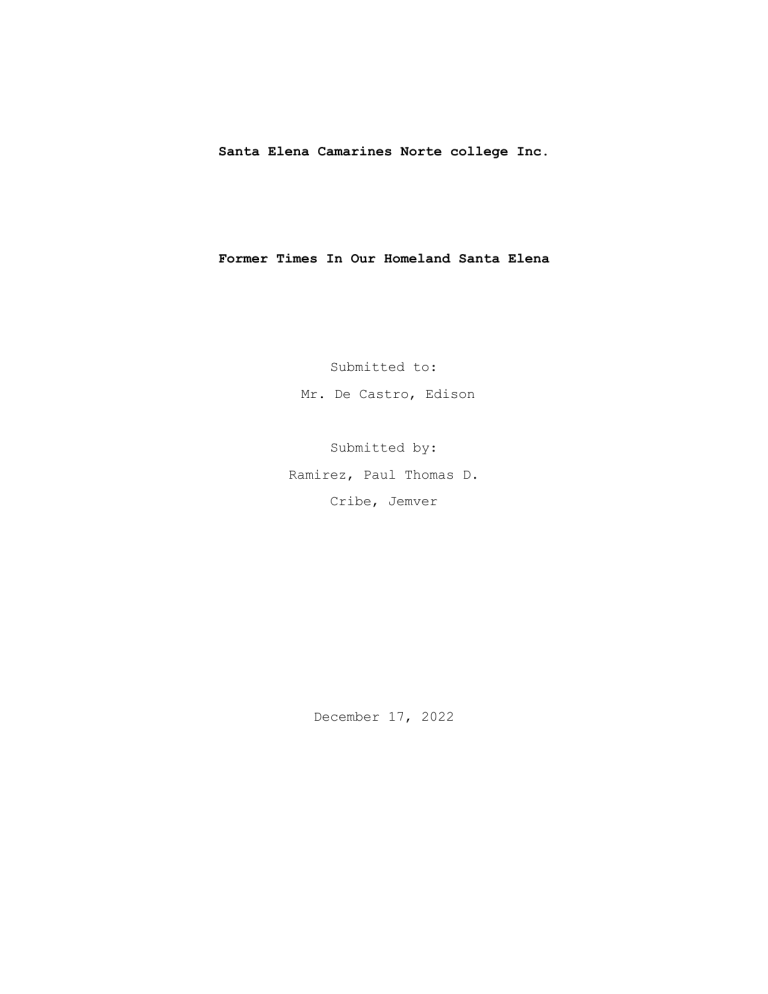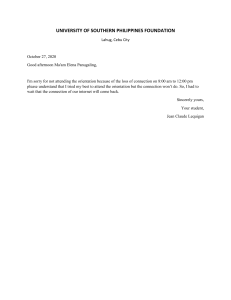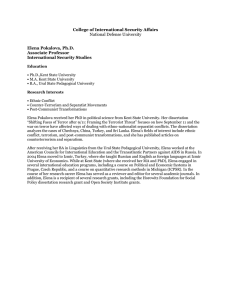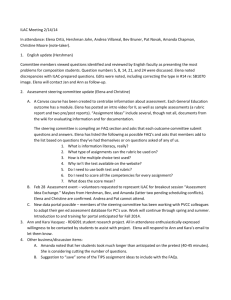
Santa Elena Camarines Norte college Inc. Former Times In Our Homeland Santa Elena Submitted to: Mr. De Castro, Edison Submitted by: Ramirez, Paul Thomas D. Cribe, Jemver December 17, 2022 INTRODUCTION “A man without a homeland will have no grave on Earth. And he forbade me to leave.” homeland is a place that we can identify with and have a special connection or it could be a place you have spent a majority of your time. In every country, there is a city or town that attracts people’s attentions. It could be a beautiful city or bear a great history displayed in its fascinating buildings or fabulous museums. Some people could have memories to share with this city. Others could sense that this city is their place to gather with their lovers and friends. Manhattan, which is known to be one of the most attractive cities in the world, astonishes people in many ways. There was a noticeable advancement through the last decades. Santa Elena Camarines Norte is the northernmost Province in Bicol Region, It is the gateway to Bicolandia. Home of the First Rizal Monument, century old churches, cascading waterfalls and paradise like islands/beaches. LOCAL HISTORY Santa Elena was formerly a barrio of Capalonga Municipality. On June 29, 1969, it was elevated into a municipality by virtue of Republic act 5480 authored by then Congressman Fernando V. Pajarillo and signed by President Ferdinand Marcos.In 2001, an area of 8,762 hectares taken from Calauag Municipality of Quezon Province were added to the territory of Santa Elena courtesy of the Supreme Court. Santa Elena before was known as Ilayang Santol, a small sitio of Barrio Pulongguit-guit, municipality of Capalonga, province of Camarines Norte. Very few reside on the place and their houses were far from each other, so that in case of an emergency, they summon each other by means of the “Tambuli” a shell conch blow horn. The Japanese played an important role in the development of Sta. Elena by providing it with an access road to the Bicol Region by shaping and opening the first road and bridges that connected Sta. Elena to Daet and to Manila. Later, the eastern Tayabas Bus Company opened regular trips from Daet to Manila. From then on, the people began building houses along the road improving the relations among residents and thereby assemblies for their development and welfare began taking shape. Until one time, in one of their assemblies, Eladio Borreo suggested to name the sitio Sta. Elena at the same time making Saint Helena, The Empress as patron saint. The motion was duly seconded and was approved unanimously. Through the efforts of the local leaders, Sta. Elena became an independent barrio in 1948 during the term of Mayor Lucio Jacob as Municipal Mayor of Capalonga, Camarines Norte. This was followed bY donations of a school site by Felimon Cudiamat and Engracio del Moro, and a municipal site donated by Silvestre del Moro and Engracio Villabroza. Later a demand by the first catholic group the acknowledgment of the Archbishop of Nueva Carceres, Naga City, to give them a missionary priest that was then assigned to the barrio in 1958 as represented by Rev. Fr. Angel Obnamia. Sta. Elena became a municipality on June 21, 1969 by virtue of Republic Act 5480 thru the initiative of the local residents and then Member of Congress Fernando V. Pajarillo. The first Municipal Mayor elected was Mayor Vicente Dimatera in 1972. A more recent development is the reacquisition of areas in nearby town of Calauag, Quezon involving a Provincial boundary dispute with Sta. Elena wherein the Supreme Court ruled in favor of Sta. Elena thus expanding the area of the municipality to its future advantage. Sta. Elena is a third-class municipality and recognized as a secondary growth center for the province because of its strategic location and rich natural resource. It has a 2010 population of 40,828 for the nineteen barangays. The town’s economy largely depends on agriculture with large tracks of coconut plantations and 10 coastal barangays relying on the bounty or produce from the fishing grounds. With a 0.78 % population growth rate, the municipal government is working to maintain this growth rate with variable population program complemented by comprehensive agro-industrial development strategy to use the town’s natural resources and population advantage in the best possible mixture. https://www.google.com/amp/s/peoplaid.com/2020/06/13/santa-elenacamarines-norte/amp/ TOURIST SPOT • MAG ASAWANG BATO/MAPPING HILL (Brgy. Salvacion, Sta. Elena Camarines Norte) (rock climbing, trekking, swimming, snorkeling) A peculiar place (huge rock couple) with a beautiful saltwater scenery. Once, locals only use this place to dry their caught fish. As time passes by, they eventually appreciate its true beauty and scenic importance in local tourism. The place was also known for its local legend which described dear love of two lovers who once lived in the place. It can be reached by renting a boat with an estimated 20-30 minutes travel time from a dockside in Brgy. San Lorenzo. Ongoing is the improvement of the Farm to Market Road leading to the Barangay center as another means of reaching the site. https://santaelena-cn.gov.ph/where-to-go/ • SANTA ELENA TWIN FALLS (Brgy. Bulala, Sta. Elena Camarines Norte) A legendary twin falls which once gained its historical worth due its intriguing discovery and was lying deep in the mountainous terrain of Sta. Elena-Labo, Camarines Norte, known for Imee-Irene Twin Falls. Its name was derived from its discoverer, former late President Ferdinand Marcos’ daughters, Imee and Irene. An urban legend that was believed by the townsfolk for generations recounts that the late president had ordered an excavation that successfully unearthed gold bar treasures. Evidence of history left paved parts beneath the falls. Today, said natural and historical treasure was preserved by the LGU and also considered as one of the most visited venues. You can reach the twin falls via a 5-10 minute short hike from its jump-off point and a suited place for recreational and picture taking activities. https://santaelena-cn.gov.ph/where-to-go/ • BALIKYAO FLOATING COTTAGES (Brgy. Pulongguit-guit, Sta. Elena Camarines Norte) (swimming, kayaking, snorkeling, fish feeding) Pulonguit-guit is known for its seashore lines of cottages. Eventually, PB Fermin Gutierrez, decided to step-up and transform local cottage culture into an exciting sea escape lodging experience near seaport. He tried to bring different level of activities in the sea such as: cottage swimming, karaoke rental, snorkeling, fish feeding, kayak, even overnight stay and many more. He never failed keep amusing local visitor of his tourism enterprise concept. Today, the venue has 12 active floating cottages available for vacationers and adventurers. Certainly, a must visit tourism area with a literal one-feet away ocean swimming experience. The place is located 15-20 minutes away from town center of Santa Elena. For inquiries, contact PB Fermin Gutierrez. https://santaelena-cn.gov.ph/where-to-go/ PRODUCTS OF STA ELENA CAMARINES NORTE Santa Elena is primarily an agricultural town where rice, fish and coconut are the main products. • • • Rice Fish Niyog CULTURE Every Year they Celebrate the town’s patron feast. The celebration is held on the 28th and 29th day of May in honor of St. Helena the Empress and every 21th day of June Santa Elena is celebrating its Foundation Anniversary. The week-long celebration in the municipality holds set of activities to showcase. Local entrepreneurs and so called palanyag and peryantes operators take this opportunity to showcase their products to local or foreign visitors along Maharlika Highway. The highlights of the activity was street dancing or so called “Kalsyaw” in the 21st day of June to include their production number demonstrating their talents and creativity in theatrics heritage dancing. Currently, one of the most spectacular events organized is the Miss Santa Elena 2019 that gave additional splendor to the celebration of Santa Elena’s foundation. During the festivity, nineteen (19) barangay were portraying different locale products, culture and inherited heritage of Sta. Eleños through constructed “kubols”. Respective locale merchandises were exhibited during the Foundation Day Week-Long Celebration at Agro-fair event located at the Mun. Quadrangle. Inter-secondary Sports Competition, Buradolan (Kite Festival) and Drum and Lyre Competition were also observed during the week-long celebration. History Challenge is also conducted to commemorate the foundation of the beloved town of Santa Elena. Currently, declaration of Padayog Festival as the official festival name of Santa Elena is on progress. It shall bring reputation and fame honoring Santa Elena’s arising own heritage and splendor. Mainly, most of the town’s culture and tradition were inherited from https://santaelena-cn.gov.ph/where-to-go/ REFERENCES Anonymous, (n.d.). HISTORY - SANTA ELENA. Retrieve from https://santaelena-cn.gov.ph/history/ Londo,R. (2018). Santa Elena Camarines Norte History, Tourist Spots, Festival, Officials. Retrieved from https://peoplaid.com/2020/06/13/santa-elena-camarines-norte/amp/ Basa, S.M. (April 24, 2016). Discover Santa Elena Camarines Norte. Retrieved from https://camnortenews.com/2016/04/24/palayogfestival-ng-municipality-of-sta-elena-muling-kampeon-sa-streetdancing-competition/






